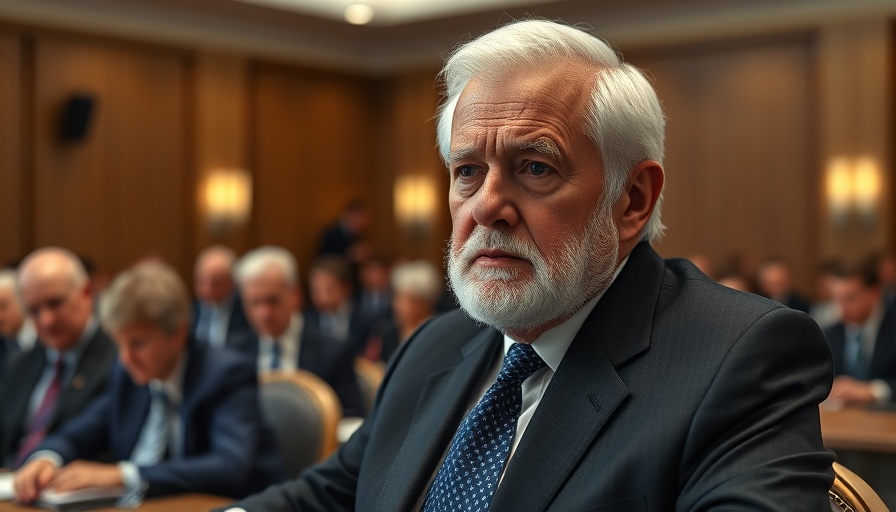
Understanding Iran's Unwavering Commitment to Its Nuclear Program
In a bold declaration, Iranian President Masoud Peskan has reaffirmed his country's commitment to its nuclear program, insisting that Iran will continue its nuclear negotiations with the United States regardless of external threats. This assertiveness stems from Iran's historical context of sanctions, military pressures, and regional tensions that have shaped its current stance on international diplomacy.
In 'Iran says it will continue nuclear talks with the US, shrugging off threats', the discussion dives into Iran's commitment to its nuclear program, prompting further examination of its implications on world affairs.
Historical Context of Iran’s Nuclear Ambitions
Iran's pursuit of a nuclear program has long been mired in controversy and geopolitical friction. The roots of this controversy can be traced back to the 1979 Iranian Revolution, after which Iran's relationships with Western powers, especially the United States, soured significantly. Western nations have frequently accused Iran of seeking to develop nuclear weapons, leading to a decade-long series of negotiations to curtail its ambition.
The 2015 Joint Comprehensive Plan of Action (JCPOA) marked a significant achievement in diplomatic efforts to limit Iran’s nuclear activities in exchange for relief from sanctions. However, the unraveling of the JCPOA, particularly following the U.S. withdrawal in 2018, has reinstated doubts about Iran's intentions and has intensified the rhetoric surrounding its nuclear capabilities.
The Current Negotiations: A Delicate Balancing Act
President Peskan's recent statements indicate that negotiations with the U.S. have reached a new expert level, suggesting that discussions are becoming more nuanced and focused on specific terms of a potential resolution. However, Peskan's assurance that Iran will never abandon its nuclear program is a stark reminder of the nation’s resilient spirit, rooted deeply in a perception of historical victimization and need for technological sovereignty.
The mention of a peaceful nuclear program implies Iran's desire to position itself as a legitimate player in the global nuclear landscape. They argue for transparency and openness to inspections, countering accusations of secretive intentions. This pledge to negotiate while maintaining their nuclear rights creates a difficult terrain for international mediators trying to reach a compromise.
Counterarguments: The Geopolitical Landscape
While Iran’s approach stems from a desire to maintain national sovereignty, critics point to the dual nature of its requests for peace while simultaneously showcasing military capabilities as conflicting. The United States and its allies fear that even a civilian nuclear program could be a preliminary step towards weaponization. As such, the global community remains on high alert, wary of Iran’s nuclear ambitions regardless of the peace rhetoric it espouses.
Moreover, echoes of the past continue to shape how many perceive Iran's nuclear aspirations. Countries in the Middle East, particularly those allied with the U.S., have voiced their concerns about an Iran equipped with advanced nuclear capabilities threatening regional stability.
Implications for African Relations and Global Diplomacy
The ongoing dialogue between the U.S. and Iran not only holds implications for international relations but also effects ripple across regions, including Africa. The African continent has grown increasingly concerned with issues of nuclear proliferation and regional security as nations eye emerging partnerships with either Iran or Western powers based on economic interests.
Understanding these dynamics is critical for African nations, particularly in balancing their diplomatic strategies. Countries like South Africa, which have been vocal advocates for nuclear disarmament and peacefulness, may need to navigate a complex global environment where geopolitical alignments shift based on nuclear discourse.
The Broader Context of Peace and Conflict
The insistence on peace by Peskan is poignant within a climate of militarization and armament treaties globally. His plea demonstrates a critical human narrative—the ongoing struggle for nations seeking respect and self-determination in a world often shaped by the will of the powerful.
Moreover, the African continent, witnessing both conflict and resolution efforts in various forms, can draw from Iran's message as a call for diplomatic engagement over militaristic shows of force. The discourse surrounding nuclear dialogue may inspire deeper discussions of peace among African states as they contend with their unique local challenges while engaging in the international sphere.
Actionable Insights for Professionals
Professionals engaged in international relations, diplomacy, and policy-making can draw significant lessons from Iran's approach to its nuclear narrative. The emphasis on dialogue, even in the face of adversity, may reflect the importance of sustained engagement in conflict resolution processes. For those focused on African politics and economy, understanding the complexities of such geopolitical discussions could foster a more nuanced perspective on how international pressures can influence regional security and stability.
In conclusion, the increasingly intricate nature of talks regarding Iran's nuclear ambitions shines a light on not merely the technical aspects of nuclear energy but the broader implications these discussions have for geostrategic relationships. The global community must navigate these complexities with diligence and foresight to promote long-term peace and stability.
If you're invested in understanding the unfolding dynamics of international relations, I urge you to keep a keen eye on not just the news from the Middle East but also how these developments resonate across various regions, including Africa. The world is interlinked, and the ripple effects of such decisions extend far beyond borders.
 Add Row
Add Row  Add
Add 




Write A Comment